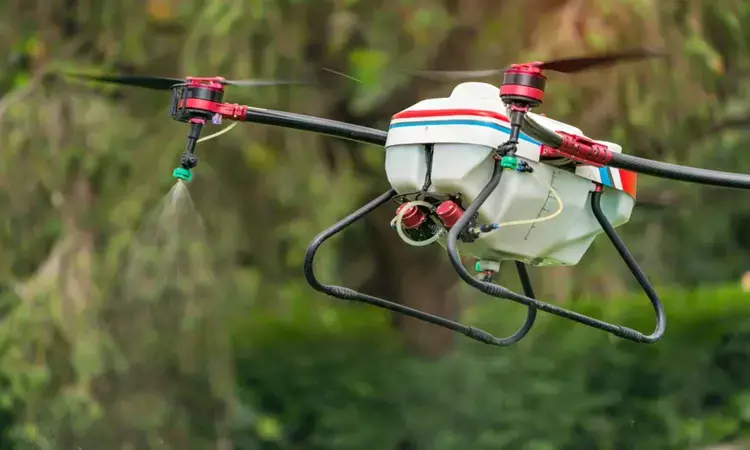- Home
- Medical news & Guidelines
- Anesthesiology
- Cardiology and CTVS
- Critical Care
- Dentistry
- Dermatology
- Diabetes and Endocrinology
- ENT
- Gastroenterology
- Medicine
- Nephrology
- Neurology
- Obstretics-Gynaecology
- Oncology
- Ophthalmology
- Orthopaedics
- Pediatrics-Neonatology
- Psychiatry
- Pulmonology
- Radiology
- Surgery
- Urology
- Laboratory Medicine
- Diet
- Nursing
- Paramedical
- Physiotherapy
- Health news
- Fact Check
- Bone Health Fact Check
- Brain Health Fact Check
- Cancer Related Fact Check
- Child Care Fact Check
- Dental and oral health fact check
- Diabetes and metabolic health fact check
- Diet and Nutrition Fact Check
- Eye and ENT Care Fact Check
- Fitness fact check
- Gut health fact check
- Heart health fact check
- Kidney health fact check
- Medical education fact check
- Men's health fact check
- Respiratory fact check
- Skin and hair care fact check
- Vaccine and Immunization fact check
- Women's health fact check
- AYUSH
- State News
- Andaman and Nicobar Islands
- Andhra Pradesh
- Arunachal Pradesh
- Assam
- Bihar
- Chandigarh
- Chattisgarh
- Dadra and Nagar Haveli
- Daman and Diu
- Delhi
- Goa
- Gujarat
- Haryana
- Himachal Pradesh
- Jammu & Kashmir
- Jharkhand
- Karnataka
- Kerala
- Ladakh
- Lakshadweep
- Madhya Pradesh
- Maharashtra
- Manipur
- Meghalaya
- Mizoram
- Nagaland
- Odisha
- Puducherry
- Punjab
- Rajasthan
- Sikkim
- Tamil Nadu
- Telangana
- Tripura
- Uttar Pradesh
- Uttrakhand
- West Bengal
- Medical Education
- Industry
First in India: ICMR conducts successful delivery of blood bag under iDrone initiative

After the experiment, we found that not only can we maintain the temperature, but there was also no damage to the products transported. We sent another sample through an ambulance & if there are no differences in the samples sent using the two modes, then this drone will be used all over India."
New Delhi: A key aspect of drones is that they can be used in healthcare during emergency response, not only for providing vaccines and medicines but also for supplying blood bags.
The inaugural flight in a validation study carried 10 units of whole blood samples from The Government Institute of Medical Sciences (GIMS) and Lady Hardinge Medical College (LHMC). This drone sortie was in the visual line of sight conducted at Jaypee Institute of Information Technology (JIIT), Noida.
In an exclusive interview with ANI, Dr Rajeev Bahl, DG ICMR, said, "This 'i-DRONE' was first used during COVID-19 pandemic by ICMR for distributing vaccines to unreachable areas. Today, we are transporting blood & blood-related products, which are supposed to be kept at a low temperature.
After the experiment, we found that not only can we maintain the temperature, but there was also no damage to the products transported. We sent another sample through an ambulance & if there are no differences in the samples sent using the two modes, then this drone will be used all over India."
The Indian Council of Medical Research (ICMR) has been a pioneer in using drones for healthcare purposes and successfully conducted the delivery of medical supplies, vaccines, and medicines in remote areas of Manipur and Nagaland.
According to Dr Nivedita Gupta, Head, Division of Epidemiology and Communicable Diseases and Scientist, ICMR explained, "Challenges in timely delivery of blood and blood products especially in the remote areas and congested metropolitan cities of India were identified. The drone-based delivery of blood may reduce the time for last-mile deliveries within the district."
"Assessing the quality and integrity of fragile bodily fluids such as blood and the impact of drone's movement is a crucial aspect which requires proper monitoring and validation," said Dr Sumit Aggarwal.
Prof Pammi Gauba, Dean, A&R and Head, Department of Biotechnology, JIIT, emphasised, "This is a pathbreaking validation study involving the collaborative efforts of ICMR, Lady Hardinge Medical College (LHMC), New Delhi, Government Institute of Medical Sciences (GIMS), Greater Noida and Jaypee Institute of Information Technology (JIIT), Noida".
"The protocol development, study designing, implementation, and coordination of the project is being undertaken by Dr Sumit Aggarwal, Dr Kuldeep Nigam, and Dr Nupur Mahajan from ICMR-Headquarters. This ICMR-funded project is being conducted under the guidance of the project principal investigators, Prof Pammi Gauba (JIIT), Prof Anita Nangia and Prof Sangeeta Pahuja from LHMC, Prof Rambha Pathak and Prof Shalini Bahadur from GIMS.
Continuing with the mission of expanding the drone ecosystem in India, the inauguration of this validation study was conducted in Jaypee Institute of Information Technology, Noida on May 10 by dignitaries from the Ministry of Health and Family Welfare, Directorate of Health Research, National Health Systems Resource Centre, Directorate General Health Services, and NITI Aayog," reads a statement by ICMR.
Dr Rajiv Bahl, Director General Indian Council of Medical Research, said, "Clarity in challenge mapping and identifying the possible solutions can be achieved by developing indigenous capacities in research and introduction of innovations and technologies in the mainstream.
With digitization, efficient manufacturing of vaccines and the development of a rapid delivery mechanism, India achieved 90pc coverage within a year. The boost of technology is an accelerator which is gradually pushing India towards achieving the status of being a developed nation as envisioned by the Prime Minister."
Kajal Rajput joined Medical Dialogues as an Correspondent for the Latest Health News Section in 2019. She holds a Bachelor's degree in Arts from University of Delhi. She manly covers all the updates in health news, hospitals, doctors news, government policies and Health Ministry. She can be contacted at editorial@medicaldialogues.in Contact no. 011-43720751


